10 Stories to Celebrate InterNational Friendship Day
InterNations, the world’s largest expat community, celebrates international friendship day with stories of intercultural bonds, and shares fresh insight from the new Expat Insider 2020 survey.
Munich, 23 July 2020 — Making new friends gets more and more challenging as an adult. It can be especially hard for those who live abroad or return home after spending years in another country. But it is not impossible! For this year’s International Day of Friendship (30 July), InterNations shares various stories of international friendships and intercultural relationships around the world.
The International Day of Friendship does not only focus on the relationships between individuals but also on the relations between countries and cultures. It stands for peaceful and friendly interactions, as well as non-violence among all people and nations. “We consider this day a great opportunity to celebrate the friendships among expats,” explains InterNations Founder & Co-CEO Malte Zeeck. “As an international community with members from all around the world, but also as a company with team members representing more than 40 different nationalities, we strongly believe in the power of bringing people together.”
To highlight both international friendships and intercultural relationships, InterNations will celebrate InterNational Friendship Week from 27 July to 2 August 2020. During the week, they will share the so far unpublished results regarding the topic of friendship from the new Expat Insider 2020 survey. Additionally, some of their members worldwide tell their most touching stories about international friendships — from moving abroad during a pandemic to relocating without knowing a soul in their destination to connecting people from all over the world in their own hometown.
Overview of the Stories
• The Iranian expat Dana moved from Kuwait to Australia without knowing anyone. Today, she describes her friends Jon and Steven as “the family I don’t have abroad”. Page 2
• Lidia, an Italian expat living in Vienna, shares how she got through self-isolation during thelockdown and how her international friends still made her birthday special. Page 2
• Sanjeev experienced reverse culture shock when he returned from Austria to London. Hestruggled to settle in again until he met David, who changed his life. Page 3
• Mark, a British expat in the USA, had just come to the UK to sort out his permanent move.When the lockdown forced him to stay, he started to volunteer in London. Page 3
• Although Adriana and Paulo met years ago at an expat event and live in different cities now, they are still in touch more frequently “than some friends living in the same city”. Page 4
• The Russian globetrotter Janie visited and made friends in nearly every country in the world. Due to Covid-19, she is forced to stay in Australia, writing a book about her journeys. Page 4
• Beatrix from Germany cherishes international friendships and is also in a happy interculturalrelationship. Attending expat events has paid off for her in multiple ways. Page 4
• Christel and Ilonka are two German expats living in the UK. Together they organize all kindsof activities for expats in their city to “enrich our circle of friends”. Page 5
• During her sabbatical in Germany, Dora from Brazil did not only make new friends but also met Stefan, who is now her partner. Her temporary stay became permanent. Page 5
• Jen and Gene, two expats from the UK and Canada who live in the Netherlands, becameclose friends right away — just in time to support each other during the Covid-19 lockdown. Page 6
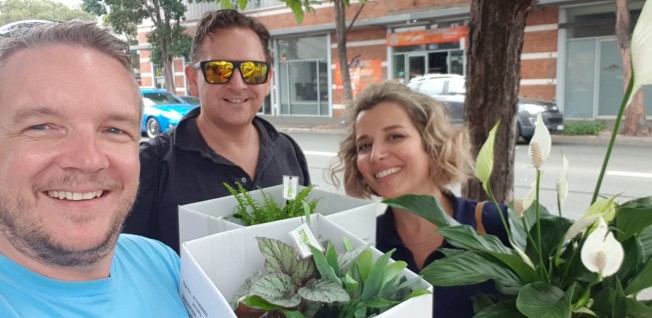
Dana: “These guys are the family I do not have abroad.”
In 2016, Dana moved from Kuwait to Australia to find a place that is “safe and beautiful”, as she puts it. “I admit that not knowing a soul in a city as big as Sydney was overwhelming at times,” Dana remembers. “Finally, one day I decided to go to an expat event — and I am so glad I did.” Dana met Jonand Steven, both expats from the United Kingdom, at her first event hosted by the InterNations Sydney Community, and they quickly became close friends.
‘’I consider myself very lucky to have met them,” Dana says and adds: “Since that night, I have had so many wonderful experiences and discovered this beautiful city. These guys are the family I do not have in Australia.” She will be “forever grateful” for their kindness and all the wonderful memories they havecreated together. “I think international friendships enrich your life in so many ways. They teach us about our similarities, as well as our unique ways of being different,” Dana says.
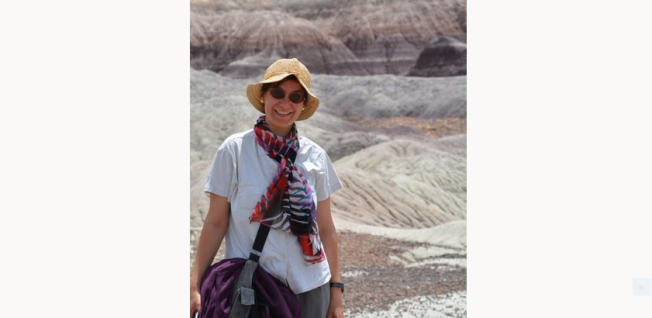
Lidia: “Suddenly I heard the doorbell and saw my friend.”
Italian expat Lidia moved to Vienna in 2010 for her research in geology. Today, she works at a Viennese museum and as a guest lecturer at a local university. Over the past decade, Austria has become her new home: ‘’I have lived in Austria long enough to feel more at home here than in my country of origin,” Lidia explains. Therefore, she did not even consider moving backwhen Covid-19 broke out.
During lockdown, Lidia expected to celebrate her 40th birthday alone, with no family members, friends, or roommates present. However, she received a lovely present from two German friends in Vienna: ‘’Suddenly I heard the doorbell and saw my friend — wearing a mask and keeping her distance — who brought me a present and wished me happy birthday.’’ On top of that, another friend from Italy, alsoliving on their own in Vienna, sent Lidia chocolate through a delivery service, which was very ‘’sweet and a nice surprise’’. From an Austrian friend, Lidia also received a special delivery, and she explainshow touched she felt that ‘’he remembered my birthday and sent me these beautiful flowers’’.

Sanjeev: ” My life feels more fun and colorful.”
Having lived in Austria for four years, Sanjeev experienced reverse culture shock when moving back to London in 2014. Some of his old friends had moved away, and Sanjeev had to face the fact that “being away for years, you will lose touch with people”.
Luckily, he met David at a picnic event for expats, shortly after moving back to London, and they got along right away. David welcomed Sanjeev with open arms, inviting him to lunches, movie nights, and parties. He also introduced Sanjeev to many of his friends, who then introduced him to theirs in turn, helping Sanjeev to quickly connect with lots of new people.
“David really changed the lifestyle that I had,” Sanjeev says. “He is one of the kindest, most generous people that I have met in my entire life. I had lived in London for a long time before and felt quite alone, but since meeting David, my life is more fun and colorful.”
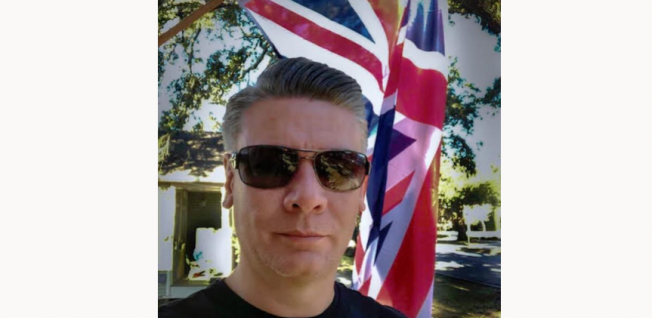
Mark: “I have managed to connect all these people.”
Mark, a British photographer, has lived in New Orleans (USA) for the past two years. He returned to London in January to finalize his visa application and to let his house to new tenants. Unfortunately, five days after he had collected his visa, the COVID-19 lockdown was imposed — and Mark was unable to travel back to his wife in the USA. While being stuck in the UK, Mark volunteered for a couple of national welfare organizations. He also used his photography skills to take 66 free family portraits from a safe distance at their doorsteps.
Throughout his time as a volunteer, Mark became great friends with the people he supported. One person he helped was Anne, a 92-year-old woman. Through posting her picture on social media, she was able to reconnect with people she had not seen in almost 40 years. “Just through photography, I have managed to connect all these people, which is a really nice feeling,” Mark thinks.
Adriana: “This is a friendship with no boundaries.”
In 2016, Adriana met Paulo for the first time at one of the events InterNations offers in São Paulo. He had just arrived in Brazil after having lived in Luanda (Angola). While he had already found an apartment, his apartment still lacked some utensils. Adriana immediately offered to go to the mall with Paulo and to show him where he could purchase plates, cups, forks, and other household items. They became friends right away.
Although Paulo now lives in Brussels and has not seen Adriana for more than a year, they still talk to each other several times a week on video chat. They always used to help each other and discuss any problems they might have with their families, jobs, and lives in general. “Even though we have not seen each other in person since September 2018, we talk to each other more than some friends living in the same city,” Adriana explains. “This is a friendship without boundaries.”
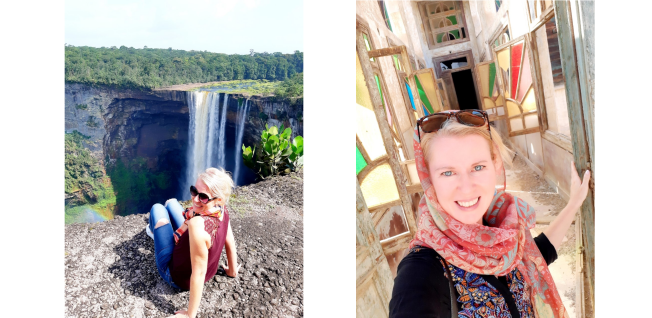
Janie: “I never met a person I didn’t find interesting.”
The Russian expat Janie has visited 238 countries and territories, and there are only ten destinations left on her bucket list. She was planning to visit these locations this year, but the coronavirus outbreak thwarted her plans for 2020. Staying in Adelaide (Australia) for a while, Janie has found the time to write a book about her journeys — Around the World in 99 Disasters.
While traveling the world, Janie normally stays with locals — strangers who then become friends. “It is my preferred way of traveling”, she explains. “And a lot of my trips would not have happened if it was not for random acts of kindness.” Janie’sbook about her travels has also given her a way to reconnect with some of the friends she has made over the past 20 years, sending them the chapters in which they are mentioned. Janie’s experience shows that stories can bring people together and reunite friends, even in the middle of a pandemic. She also believes that every single place is special and worth visiting: “I have never been to a place, not even a little village, that I felt I had seen before, just like I have never met a person I did not find interesting.”
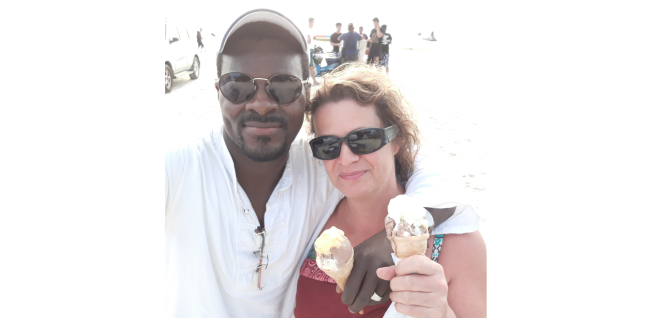
Beatrix: “What we have in common is more important.”
Beatrix, a German living in Jülich, met her partner Sulaiman just two years ago. He has lived a very international life: Being born in Burkina Faso, he then studied in Ghana and Nigeria. After that, he received his doctorate in Malaysia, where he worked as a scientist, conducting a study on marine technology and seaweed farming. He has also traveled to nearly all countries across the globe. After being in a long-distance relationship with Beatrix, Sulaiman finally moved to Germany in 2020.
An international relationship is not always easy, but they would not want to have it any other way. “We always say that our intercultural relationship will never be boring,” Beatrix shares. Communicating in English most of the time, which is neither’s mother tongue, does not make things any easier: “At the beginning, of course, we often had misunderstandings because we come from different cultures.” But they have come to see these differences as a chance to grow and learn from each other: “We feel that what we have in common is much more important than the differences in our personalities and cultures.”
Christel: “She has drawn me into a lovely circle of friends.”
Although both of them have German roots, Christel and Ilonka see themselves as having completely different personalities. “With her bubbly personality and outspoken mind, she has drawn me into a circle of lovely people,” Christel says about Ilonka. While Christel describes herself as someone rather quietwho likes to observe people first, Ilonka immediately finds a way to strike up a conversation.
They do have two things in common, though: Both women have settled down in the United Kingdom, and they are also enthusiastic event hosts in the InterNations Nottingham Community. Christel and Ilonka run two InterNations Groups — the Nottingham Book Group and the Nottingham “Cuppa” Group — organizing all kinds of activities for expats and global minds in town. “I have never made so many friends in my life before because our groups keep growing all the time, and it is just nice to go out with other people,” Christel explains.
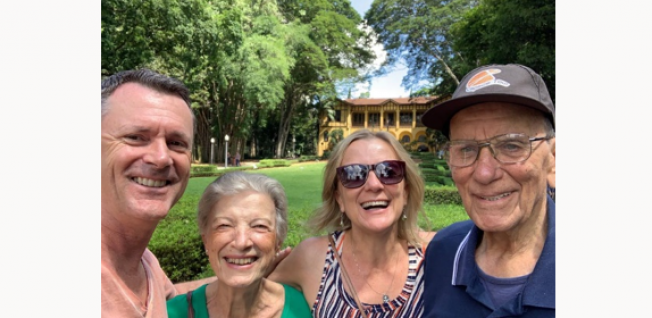
Dora: “I can see through different eyes.”
Originally from Brazil, Dora moved to Augsburg (Germany) for a sabbatical year in 2018. Not knowing anyone in town, she hoped that attending events for expats would be a great way of getting to know new people — and it was: At one of her first events in Augsburg, she met Stefan, the man who would later become her partner.
After a while, Dora’s temporary sabbatical turned into a permanent relocation. The couple has been living together since November 2018, and they have traveled to Brazil twice to meet Dora’s parents. Dora loves the mix of languages and cultures that comes from being in a relationship with Stefan — they speak “50% German and 50% English”, she explains. Stefan is also learning Portuguese so that he can communicate more easily with Dora’s family in Brazil. Dora believes that being in an intercultural relationship, as well as having international friends, allows “you to see things through different eyes”.
Gene & Jen: “That was the first, last, and only time that all five of us were together.”
The Canadian Gene and the British expat Jen met in the Netherlands at one of the last in-person events before lockdown measures due to the coronavirus pandemic were put in place. They also met two expats from Brazil and one from Slovakia the same night. All five of them got along right away. “But that was the first, last, and only time that all five of us were together, before the lockdown started,” Gene notes.
The new friendship group was formed just in time. Jen points out how all of them were going through similar challenges in self-isolation. She recommends that expats who might be feeling a bit lonely right now, especially during periods of social distancing, should not be afraid to reach out to other expats online. “Everyone is in the same position at the moment,” Jen says. “People do understand and are willing to help and share their experiences and stories to support you.”
The Best Countries for Expats to Find Friends
In the new Expat Insider 2020 survey, Mexico emerges as the best country to make friends abroad for the third year in a row. More than seven in ten expats find it easy to make friends in general (73% vs. 47% globally), as well as local friends (71% vs. 42% globally). A US American mentions the “friendly local people” as one of the things she likes most about living in Mexico, and a Portuguese expat emphasizes “how easy is to get along with the locals”.
Out of the 58 countries featured in the survey, Mexico is followed by Bahrain (2nd), Ecuador, Colombia, Panama, Taiwan, Malaysia, Indonesia, Argentina, and the Philippines (10th). WhileBahrain, Ecuador, Colombia, and the Philippines were already part of the best countries for making friends in 2019, the others are new among the top 10. Panama is the biggest winner in this category, moving up 28 ranks (from 33rd to 5th) in just one year. Now, 64% of expats find it easy to make new friends there, compared to 47% globally.
In seven of the top 10 countries (all except for Bahrain, Panama, and Malaysia) an above-average share of expats say they are mainly friends with locals. For example, more than half the expats in Colombia (52%) say so, which is 33 percentage points above the global average (19%) and the highest share worldwide.
The top 10 countries for making friends also perform very well in the Feeling at Home and Friendliness subcategories. In fact, at least three-quarters of the respondents describe the local residents as generally friendly towards expats in all ten countries. In Panama (75%) this share is the lowest, while Mexico is on top of the list once again (90%), compared to 66% globally.
Worst Countries forn Expats to Find Friends
At the other end of the ranking scale, Denmark (58th) is rated the worst country for finding friends for the second year in a row. Nearly three in five expats in Denmark (58%) have trouble making new friends abroad (vs. 33% globally). “Danes have their friends from growing up or university,” a US American expat explains. “And they consider them lifelong friends, so they are not very open to making new friends.” She also shares: “But a lot of expats are here, and it is easy to make friends with them, since they also feel lonely, having no Danish friends either.”
Denmark is followed by Kuwait (57th), Sweden, Norway, Japan, Switzerland, South Korea, Finland, the Netherlands, and Austria (49th). Only Japan is new among the bottom 10—the other ninecountries ranked among the worst in world last year as well. More than half the expats in Japan (52%) have trouble making new friends (vs. 33% globally), and 55% think that it is difficult to make local friends in particular (vs. 38%). “Making good local friends takes a lot of effort,” a Bangladeshi expat shares.
It looks like the lack of friends is reflected in the respondents’ social life. All ten countries show below-average results for the respondents’ satisfaction with their social life. For example, more than half the expats in Kuwait (52%) rate their social life negatively, which is the highest share worldwide and 28 percentage points above the global average (24%).
It is also hard for expats to get used to the local culture in these countries, and they tend to describe the locals as generally unfriendly towards foreign residents. A Canadian expat in Sweden shares that “people are not so friendly if you do not speak Swedish” and that it is “hard to make friends if you do not speak the language”. In fact, 28% of expats in Sweden consider the local population to be generally unfriendly towards foreigners (vs. 18% globally), which is, however, not the highest share worldwide. An even larger share of expats in South Korea (29%), Switzerland (29%), Denmark (36%), Austria (38%), and Kuwait (53%) struggle with a similar attitude.
Filed under: Press Release on July 23rd, 2020